In line of what you say about immunization, I just wrote about what happen with my hippo and ich. My hippo was covered with ich at the beginning of November, and it is now doing well. I do think it cured itself. Would it happen again? May be. But then human get cold frequently.
Navigation
Install the app
How to install the app on iOS
Follow along with the video below to see how to install our site as a web app on your home screen.
Note: This feature may not be available in some browsers.
More options
You are using an out of date browser. It may not display this or other websites correctly.
You should upgrade or use an alternative browser.
You should upgrade or use an alternative browser.
A sideline discussion on Copper and overall benefits/detriments of prophylactic treatment in QT
- Thread starter Subsea
- Start date
- Tagged users None
That is right Jay, But the slime on a fish will repel and possibly kill those parasites. If that were not true, my tank would not exist.Actually, the type of skin involved has nothing to do with external metazoan parasites, as dog or cat, frog or fish, these parasites pierce the skin and get bodily fluids directly.
As for immunity only lasting a short time, that is not correct in the type of system I run. (but it is in a lab) I want some parasites living in my system and never try to kill them for if I kill them the immunity will wane as fish, and us need to be exposed to them to stay immune. (we all know that)
If you quarantine, yes the fish will lose any immunity they had in the sea.
I have to go now and get my flu shot because the one I got last year ran it's course and I need anther one or I will lose my immunity to the flu.
I posted this already and you commented on it but I know you like to read things from "Professionals, researchers or someone with a PHD". I don't. I would rather take advice from someone who actually is successful at this than someone who learned from another professor someplace who may have never kept a fish in a home tank.
If someone told me they keep chickens for 25 years by having them listen to RAP music, I would think they were nuts. But if I spent the next 25 years living with his chickens, I would buy a bunch of RAP CDs.
Attribution License, which permits unrestricted use, distribution, and reproduction in any medium, provided the original work is properly cited.
(ISRN ImmunologyVolume 2012 (2012), Article ID 853470, 29 pageshttp://dx.doi.org/10.5402/2012/853470Review ArticleAn Overview of the Immunological Defenses in Fish SkinMaría Ángeles Esteban)
Quote: Immunity associated with the parasites depends on the inhabiting discrete sites in the host. Especially important for this paper are the ectoparasites, those habiting in or on the skin. Until recently there had been little direct evidence of innate immune mechanisms against parasites associated with mucosal epithelium [285]. The active immunological role of skin against parasitic infection has been shown recently [286–288], and now mucosal immunity against them start to be elucidated.
Non-parasitic fishes usually die following infection, but animals surviving sublethal parasite exposure become resistant to subsequent challenge. This resistance correlates with the presence of humoral antibodies in the sera and cutaneous mucus of immune fishes.
According to these authors "probiotic for aquaculture is a live, dead or component of a microbial cell that, when administered via the feed or to the rearing water, benefits the host by improving either disease resistance, health status, growth performance, feed utilisation, stress response or general vigour, which is achieved at least in part via improving the hosts or the environmental microbial balance."The first demonstration that probiotics can protect fishes against surface infections was against Aeromonas bestiarum and Ichthyophthirius multifiliis in rainbow trout [330]. The research on this topic is considered of high priority at present because enriched diets could be used as preventive or curative therapies for farmed fishes. End Quote
That is right Jay, But the slime on a fish will repel and possibly kill those parasites. If that were not true, my tank would not exist.
As for immunity only lasting a short time, that is not correct in the type of system I run. (but it is in a lab) I want some parasites living in my system and never try to kill them for if I kill them the immunity will wane as fish, and us need to be exposed to them to stay immune. (we all know that)
If you quarantine, yes the fish will lose any immunity they had in the sea.
I have to go now and get my flu shot because the one I got last year ran it's course and I need anther one or I will lose my immunity to the flu.
I posted this already and you commented on it but I know you like to read things from "Professionals, researchers or someone with a PHD". I don't. I would rather take advice from someone who actually is successful at this than someone who learned from another professor someplace who may have never kept a fish in a home tank.
If someone told me they keep chickens for 25 years by having them listen to RAP music, I would think they were nuts. But if I spent the next 25 years living with his chickens, I would buy a bunch of RAP CDs.
Attribution License, which permits unrestricted use, distribution, and reproduction in any medium, provided the original work is properly cited.
(ISRN ImmunologyVolume 2012 (2012), Article ID 853470, 29 pageshttp://dx.doi.org/10.5402/2012/853470Review ArticleAn Overview of the Immunological Defenses in Fish SkinMaría Ángeles Esteban)
Quote: Immunity associated with the parasites depends on the inhabiting discrete sites in the host. Especially important for this paper are the ectoparasites, those habiting in or on the skin. Until recently there had been little direct evidence of innate immune mechanisms against parasites associated with mucosal epithelium [285]. The active immunological role of skin against parasitic infection has been shown recently [286–288], and now mucosal immunity against them start to be elucidated.
Non-parasitic fishes usually die following infection, but animals surviving sublethal parasite exposure become resistant to subsequent challenge. This resistance correlates with the presence of humoral antibodies in the sera and cutaneous mucus of immune fishes.
According to these authors "probiotic for aquaculture is a live, dead or component of a microbial cell that, when administered via the feed or to the rearing water, benefits the host by improving either disease resistance, health status, growth performance, feed utilisation, stress response or general vigour, which is achieved at least in part via improving the hosts or the environmental microbial balance."The first demonstration that probiotics can protect fishes against surface infections was against Aeromonas bestiarum and Ichthyophthirius multifiliis in rainbow trout [330]. The research on this topic is considered of high priority at present because enriched diets could be used as preventive or curative therapies for farmed fishes. End Quote
Immunity in a fish's skin to metazoan parasites is very weak. When you read papers about this process, they are just identifying that there is a process, not that it controls disease outbreaks in aquariums. In fact, the link you provided is a preliminary study into this process, as groundwork for developing "novel vaccination strategies" which is NOT what we are discussing here.
You may have seen this text of mine, it applies more to aquariums:
Immunity to disease
The ability for a fish to fight off a disease (or not) is based on the level of immunity it has. A physically stressed fish will have a lower immunity level and be more prone to developing disease. However, people tend to rely too much on immunity, and they think that if they offer the fish a great diet, it will be (mostly) free of disease. Some people extrapolate that even further and think that if they have a sick fish, if they feed it will, they can cure it (the chicken soup syndrome). The reality is that fish have a less developed immune response than mammals do, and we know that with humans, even the best diet and exercise does not prevent all diseases and in some instances really doesn’t help much at all. Immunity varies between the parasite involved. Bacterial diseases are rarely communicable because the fish have good defense (skin structure) and good immunity against them. Fish don’t have much immunity against some parasites like Neobenedenia flukes.Innate immunity – this is the fish’s genetic predisposition to being able to fight off infections using its normal antibody system. There are differences seen between species of fish, with the example of Achilles tangs being much more prone to developing Cryptocaryon infections than are yellow tangs. Innate immunity is the baseline level, the starting point and nothing really changes that in a given individual.
Immunity conferred by good diet/environment – Fish with lower stress levels will have better immunity. Keeping the fish in a stable aquarium, with no aggressive tankmates, good water quality and a great diet will help boost its immunity. However, people often fail to understand that the disease organism themselves can be a major stressor and can override all immunity conferred by a good environment. It is a grave mistake to attempt to treat an active disease outbreak solely by increasing the quality of the diet and environment.
Acquired immunity – This type of immunity is mounted by a fish after exposure to (and survival from) some disease outbreak. Antibodies are created to help the fish fight off future infections from that disease organism. Too many times in aquariums, the fish does not survive the disease challenge, so no acquired immunity is possible. In most cases, the only functional benefit for this is seen with sub-lethal viral diseases such as Lymphocystis; a fish that recovers from that disease rarely acquires it again. Wild fish have very little acquired immunity by virtue of not being infected with disease organisms to a high enough degree (or if they are, they get eaten by predators due to their weakened state). Immune responses in fish seem strongest against viruses and least against multi-celled parasites such as flukes. Parasites living on the skin or gills of fish are less exposed to the antibodies, so acquired immunity to protozoans and metazoans such as Cryptocaryon, Amyloodinium and flukes is only partial and transient.
Jay
I do have to disagree a little with some of that. Especially the part that "good food will not cure disease". I agree, it won't. But I also believe the right food is not necessarily from an LFS and along with a few other easily repeatable factors will "keep fish from getting infected" forever.
Good food to me, is food with living gut bacteria like live worms or fresh clams. Do you have a theory on how my fish have lived for their normal lifespan for 50 years while "never", not even once getting a communicable disease? I do add fish often when they die of old age, give them away or jump out. I added probably 8 small fish this month from a questionable store after I gave away two large fish.
If they are not immune and stay immune, why are they living? I have no quarantine tank or medications. Many people on these forums including Humblefish and SubSea came here to see my tank.
I have never posted on a disease forum about a communicable disease. Why not? What am I doing except feeding foods with living bacteria and keeping stress to a minimum? Many of my fish are spawning.....Why?
I often add fish with parasites as they mean nothing to me. Where did the parasites go? I posted 3 or 4 times with pictures of infected fish I added. Why doesn't my tank crash?
I have no idea except what I mentioned. I know all about the life cycle of parasites and how virulent velvet is.
I find it silly that so many people allow their fish to become sick when an electrician like me never has any problems with that. Why?
Here is part of another article you may have read.
Jay, I don't make this stuff up in a drunken stupor, but I enjoy reading it from researchers much smarter than I am. Maybe they got it from reading my book.
Good food to me, is food with living gut bacteria like live worms or fresh clams. Do you have a theory on how my fish have lived for their normal lifespan for 50 years while "never", not even once getting a communicable disease? I do add fish often when they die of old age, give them away or jump out. I added probably 8 small fish this month from a questionable store after I gave away two large fish.
If they are not immune and stay immune, why are they living? I have no quarantine tank or medications. Many people on these forums including Humblefish and SubSea came here to see my tank.
I have never posted on a disease forum about a communicable disease. Why not? What am I doing except feeding foods with living bacteria and keeping stress to a minimum? Many of my fish are spawning.....Why?
I often add fish with parasites as they mean nothing to me. Where did the parasites go? I posted 3 or 4 times with pictures of infected fish I added. Why doesn't my tank crash?
I have no idea except what I mentioned. I know all about the life cycle of parasites and how virulent velvet is.
I find it silly that so many people allow their fish to become sick when an electrician like me never has any problems with that. Why?
Here is part of another article you may have read.
Abstract
The interplay between nutrition and immune system is well recognised, however the true integration of research between nutrition, animal energy status and immune function is still far from clear. In fish nutrition, especially for species maintained in aquaculture, formulated feeds are significantly different from the natural diet with recent changes in nutrient sources, especially with protein and oil sources now being predominated by terrestrial derived ingredients. Additionally, many feeds are now incorporated to health management and termed functional feeds, which are believed to improve fish health, reduce disease outbreaks and/or improve post-infection recovery. Using new omics technologies, including transcriptomics (microarray and RNA-seq) and proteomics, the impacts of nutrition on the immune system is becoming clearer. By using molecular pathway enrichment analysis, modules of genes can indicate how both local (intestinal) and systemic immune function are being altered. Although great progress has been made to define the changes in host immune function, understanding the interplay between fish nutrition, intestinal microbiome and immune system is only just beginning to emerge.Jay, I don't make this stuff up in a drunken stupor, but I enjoy reading it from researchers much smarter than I am. Maybe they got it from reading my book.
Cichlid Dad
2500 Club Member
View Badges
Partner Member 2024
Hospitality Award
Pacific Northwest Reefers
Rock Pool Reef Keepers
R2R Secret Santa 2023
My Tank Thread
My Aquarium Showcase
Cichlid Dad
2500 Club Member
View Badges
Partner Member 2024
Hospitality Award
Pacific Northwest Reefers
Rock Pool Reef Keepers
R2R Secret Santa 2023
My Tank Thread
My Aquarium Showcase
I know this, said with love, you both have really helped so many people in your careers and I know we are all better reefers for having you here. I just want to say thank you both for all you do for the hobby.
- Joined
- Dec 28, 2016
- Messages
- 22,829
- Reaction score
- 21,964
The problem with many ideas in reefing is that people pay attention only to the evidence that supports their ideas, and possibly read in more to that evidence than the authors meant to express? IMHO, some of the 'facts' in the articles are being misread. For example - comparing anti-infectives in fish skin, and saying it's not comparable to dog skin (or human skin) - is at least partially not true. 1. Human skin itself is a barrier to infection. 2. "The dermcidin peptide produced by human sweat glands acts like an antibiotic on the skin and fights infections."I do have to disagree a little with some of that. Especially the part that "good food will not cure disease". I agree, it won't. But I also believe the right food is not necessarily from an LFS and along with a few other easily repeatable factors will "keep fish from getting infected" forever.
Good food to me, is food with living gut bacteria like live worms or fresh clams. Do you have a theory on how my fish have lived for their normal lifespan for 50 years while "never", not even once getting a communicable disease? I do add fish often when they die of old age, give them away or jump out. I added probably 8 small fish this month from a questionable store after I gave away two large fish.
If they are not immune and stay immune, why are they living? I have no quarantine tank or medications. Many people on these forums including Humblefish and SubSea came here to see my tank.
I have never posted on a disease forum about a communicable disease. Why not? What am I doing except feeding foods with living bacteria and keeping stress to a minimum? Many of my fish are spawning.....Why?
I often add fish with parasites as they mean nothing to me. Where did the parasites go? I posted 3 or 4 times with pictures of infected fish I added. Why doesn't my tank crash?
I have no idea except what I mentioned. I know all about the life cycle of parasites and how virulent velvet is.
I find it silly that so many people allow their fish to become sick when an electrician like me never has any problems with that. Why?
Here is part of another article you may have read.
Abstract
The interplay between nutrition and immune system is well recognised, however the true integration of research between nutrition, animal energy status and immune function is still far from clear. In fish nutrition, especially for species maintained in aquaculture, formulated feeds are significantly different from the natural diet with recent changes in nutrient sources, especially with protein and oil sources now being predominated by terrestrial derived ingredients. Additionally, many feeds are now incorporated to health management and termed functional feeds, which are believed to improve fish health, reduce disease outbreaks and/or improve post-infection recovery. Using new omics technologies, including transcriptomics (microarray and RNA-seq) and proteomics, the impacts of nutrition on the immune system is becoming clearer. By using molecular pathway enrichment analysis, modules of genes can indicate how both local (intestinal) and systemic immune function are being altered. Although great progress has been made to define the changes in host immune function, understanding the interplay between fish nutrition, intestinal microbiome and immune system is only just beginning to emerge.
Jay, I don't make this stuff up in a drunken stupor, but I enjoy reading it from researchers much smarter than I am. Maybe they got it from reading my book.
- Joined
- Dec 28, 2016
- Messages
- 22,829
- Reaction score
- 21,964
I would rather take advice from someone who actually is successful at this than someone who learned from another professor someplace who may have never kept a fish in a home tank.
As you have said yourself, you and others have had success (you have had great success). That said, there are hundreds of posts on this site where people using a non-quarantine method have lost multiple fish in a short time. Contrary to what has been written on this thread, it is not people who have treated fish with copper or prazipro, rather it is people who have used no medication that have fish dying (at least to my reading)
My method, that took me half a century to perfect has a lot more to it than the food I recommend. If you start a tank and feed the proper food while using dead rock and asw your tank will most likely fail. (by fail I mean get some sort of infection or parasite)
If you set up any tank and use PVC for hiding places, your tank will probably fail no matter what you feed.
If you don't have the proper "tight" natural hiding places (many of them) where the fish can get out of sight and can't see you your tank will probably fail.
If you don't have some age on your rocks and "yes" mulm, your tank will probably fail.
"Mulm" which comes naturally from dying algae, pod shells and all sorts of detritus is very important IMO.
It grows all over the sea and is the basis of the food chain but besides that, provides "natural" hiding places that many fish "grew up" in.
It grows on the most productive areas of the sea that are loaded with fish. You can see the cottony growths here.
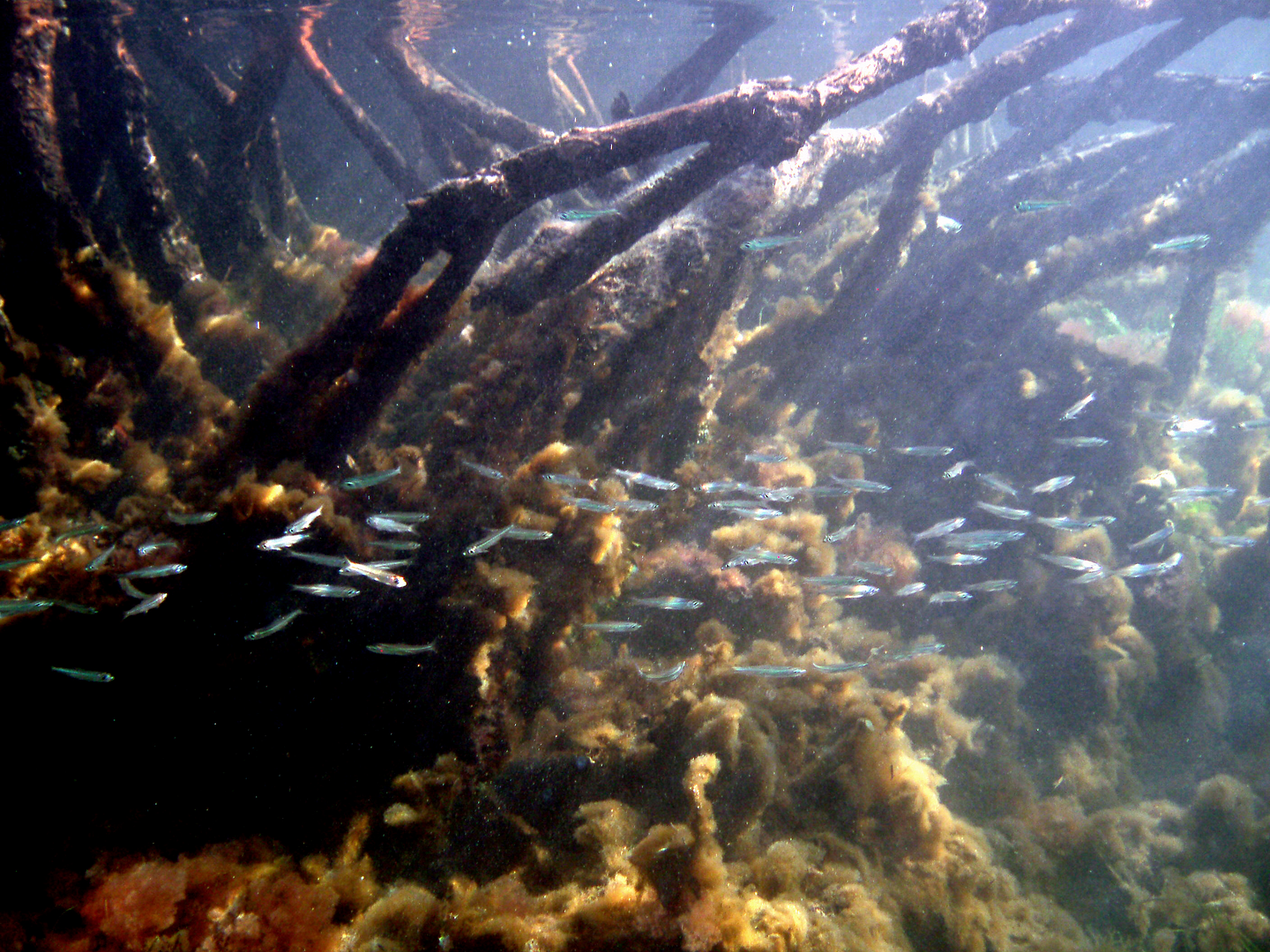
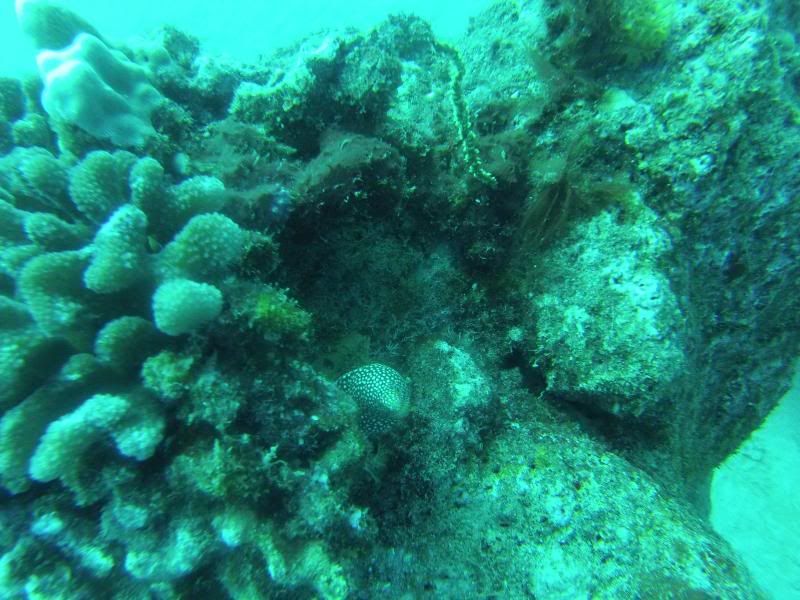
Notice the fry.
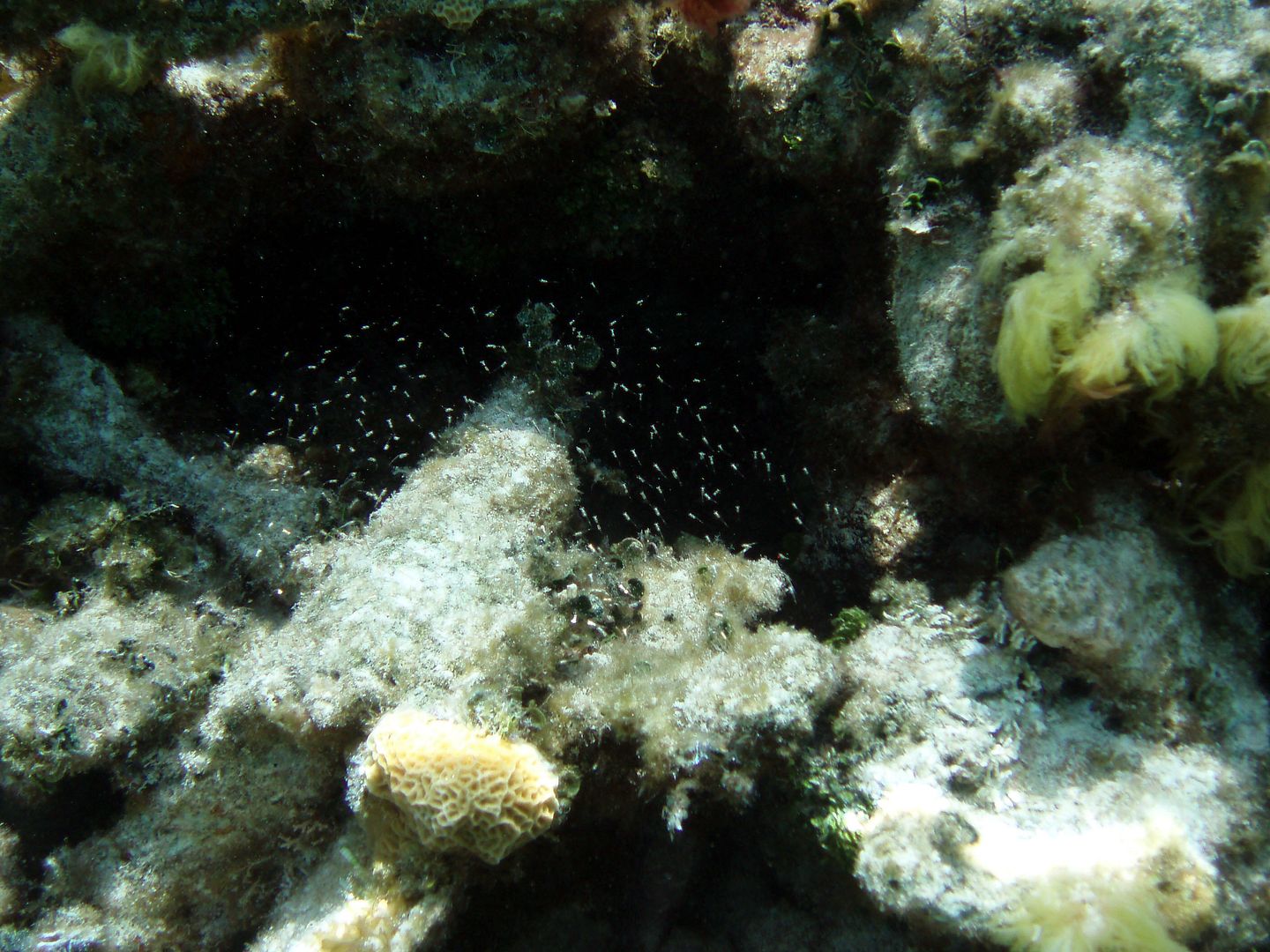
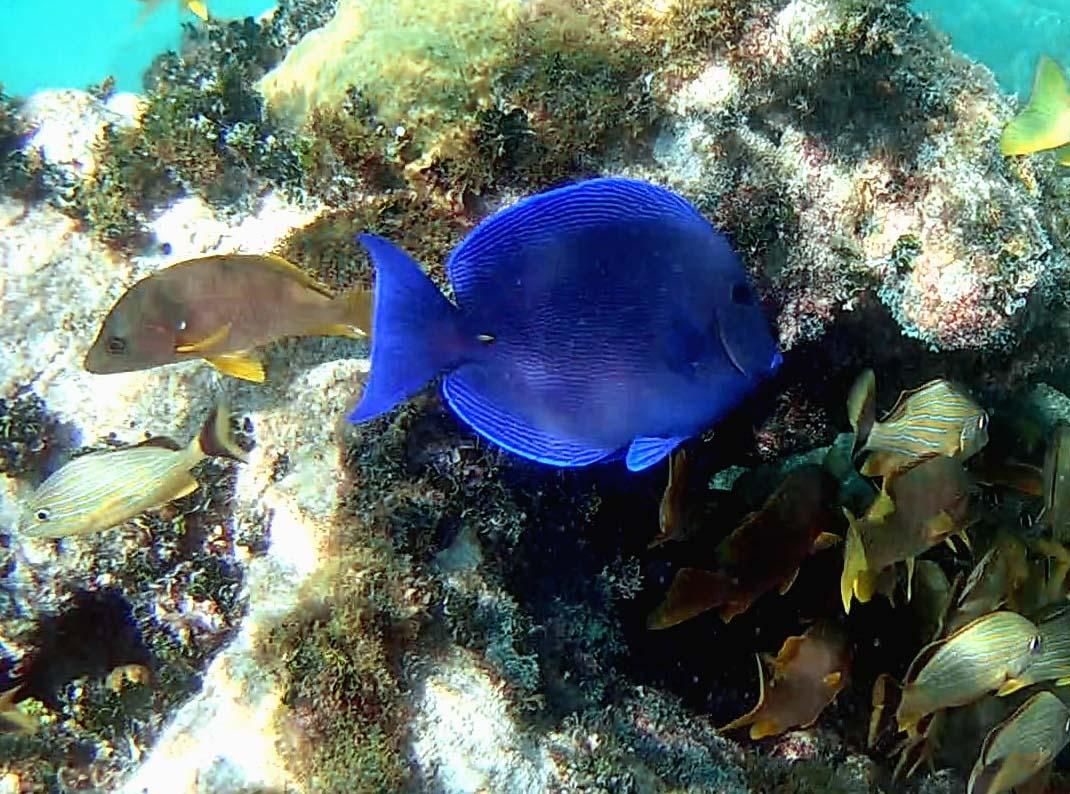
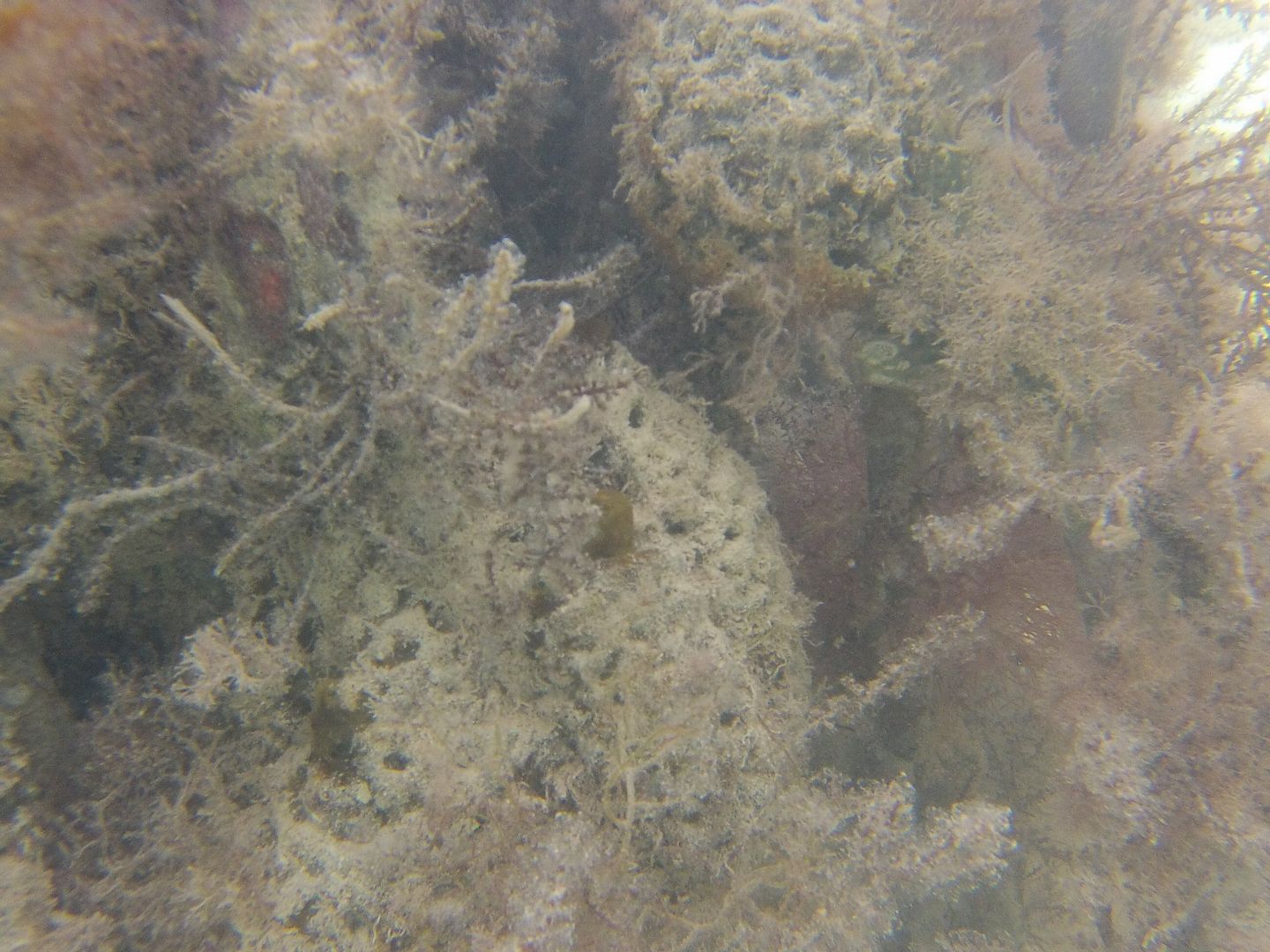
You want to know how fish live in the sea? Jump in and watch them.
IMO we keep our tanks much to clean. The tank is for the fish. If we want the tank to be nice to us, the fish won't like it. If we want fish to stay healthy and happy, allow them to think they are in the sea. The vast majority of tanks don't look anything like the sea and that is a big problem we hardly ever address.
My tank grows mulm as you can see here. It is natural. This Possum wrasse is probably 10 years old, give or take 3 years. Many people won't like this, but look at the smile on that fish.
Many people won't like this, but look at the smile on that fish. 
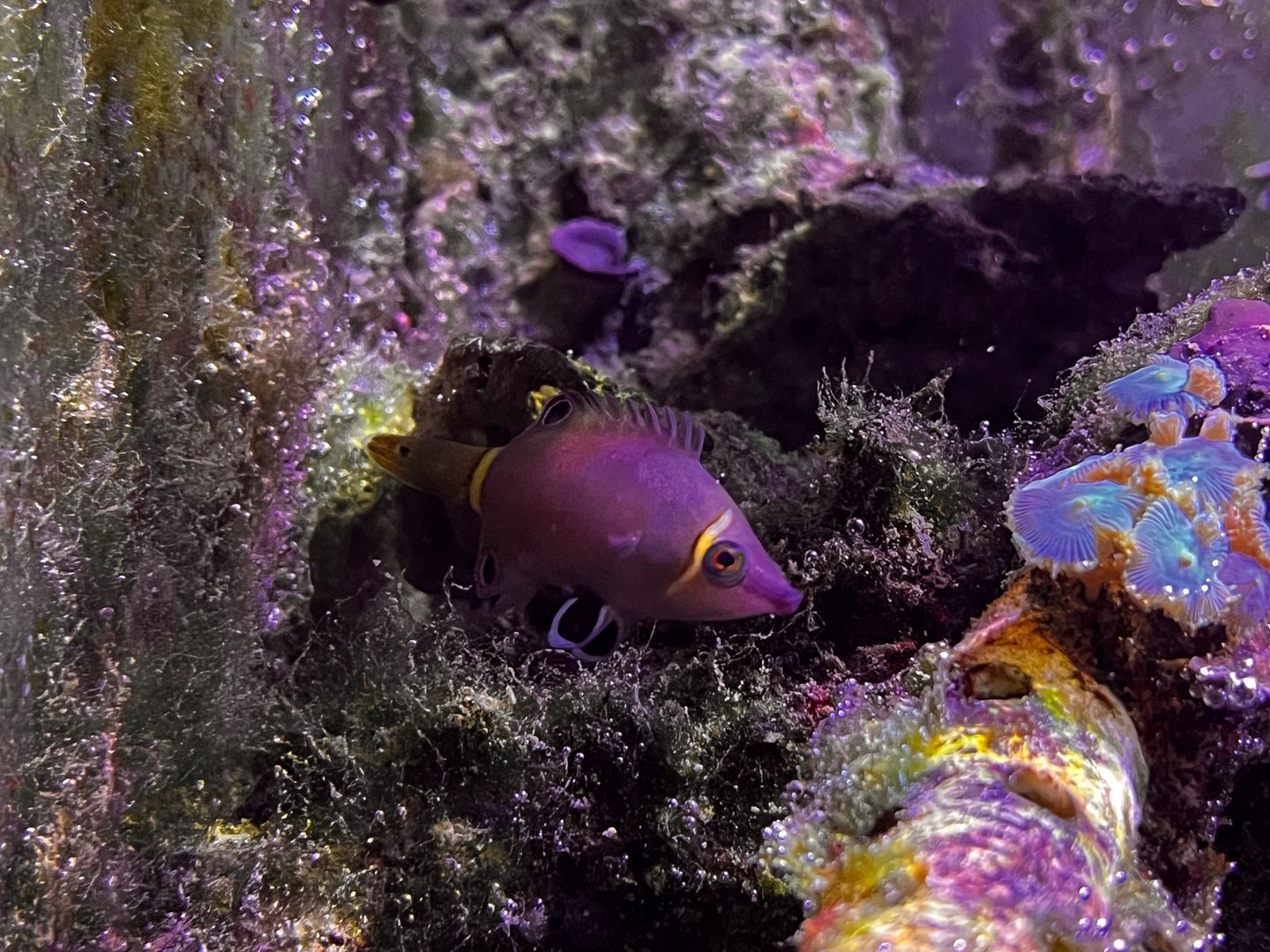
These guys grew from babies in my tank, they hatched out many babies and died of old age about 10 or 12 years old.
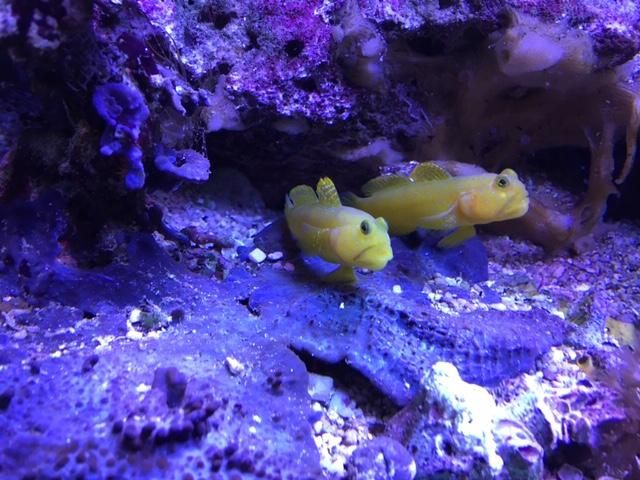

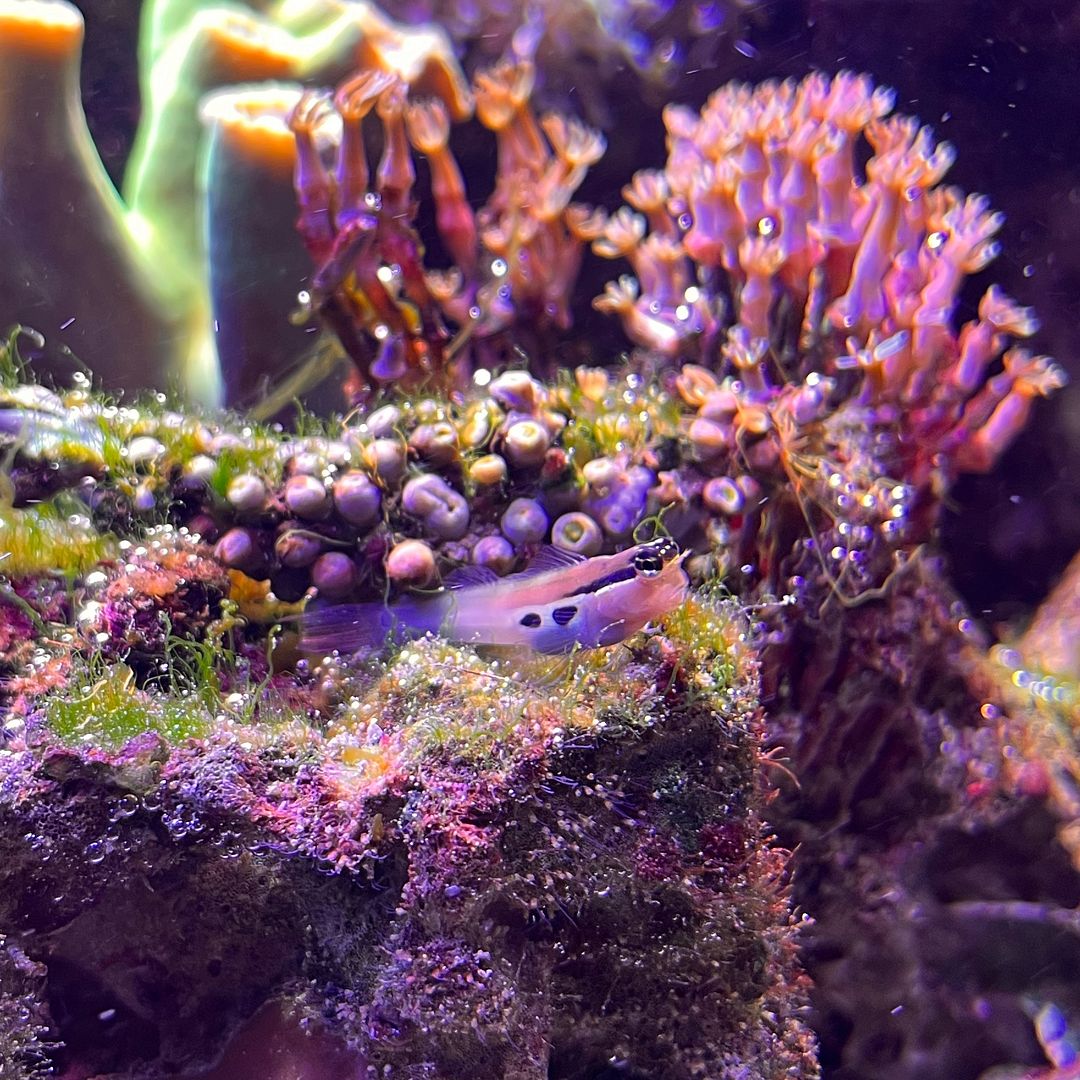
Fish don't like clean. My wife likes clean but she is not a fish. Fish like exactly what the sea looks like, anything else stresses them.
If peoples tanks fail and they say they use my methods. Maybe they don't use my "entire" methods as a partial method will not work.
This picture may be 25 years old or more, I have no idea but it certainly looks natural to me. That Fierclown on the far left is over 30 years old and I still have her and her mate.
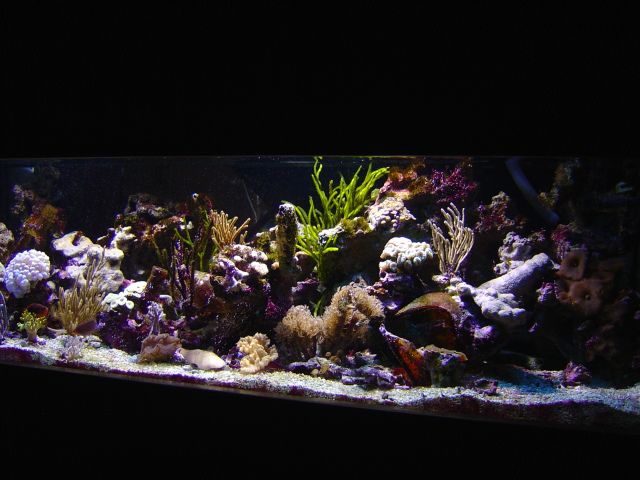
If you set up any tank and use PVC for hiding places, your tank will probably fail no matter what you feed.
If you don't have the proper "tight" natural hiding places (many of them) where the fish can get out of sight and can't see you your tank will probably fail.
If you don't have some age on your rocks and "yes" mulm, your tank will probably fail.
"Mulm" which comes naturally from dying algae, pod shells and all sorts of detritus is very important IMO.
It grows all over the sea and is the basis of the food chain but besides that, provides "natural" hiding places that many fish "grew up" in.
It grows on the most productive areas of the sea that are loaded with fish. You can see the cottony growths here.


Notice the fry.



You want to know how fish live in the sea? Jump in and watch them.
IMO we keep our tanks much to clean. The tank is for the fish. If we want the tank to be nice to us, the fish won't like it. If we want fish to stay healthy and happy, allow them to think they are in the sea. The vast majority of tanks don't look anything like the sea and that is a big problem we hardly ever address.
My tank grows mulm as you can see here. It is natural. This Possum wrasse is probably 10 years old, give or take 3 years.
These guys grew from babies in my tank, they hatched out many babies and died of old age about 10 or 12 years old.


Fish don't like clean. My wife likes clean but she is not a fish. Fish like exactly what the sea looks like, anything else stresses them.
If peoples tanks fail and they say they use my methods. Maybe they don't use my "entire" methods as a partial method will not work.
This picture may be 25 years old or more, I have no idea but it certainly looks natural to me. That Fierclown on the far left is over 30 years old and I still have her and her mate.

Last edited:
- Joined
- Dec 28, 2016
- Messages
- 22,829
- Reaction score
- 21,964
Here is my only question - IF someone is starting a new tank - obviously, they will not have the criteria that you require for success. Yet many people read posts and say. - oh if I feed natural foods, etc - I don't have to worry about disease. IMHO, this is a dis-service to anyone starting a new tank.My method, that took me half a century to perfect has a lot more to it than the food I recommend. If you start a tank and feed the proper food while using dead rock and asw your tank will most likely fail. (by fail I mean get some sort of infection or parasite)
If you set up any tank and use PVC for hiding places, your tank will probably fail no matter what you feed.
If you don't have the proper "tight" hiding places (many) where the fish can get out of sight and can't see you your tank will probably fail.
If you don't have some age on your rocks and "yes" mulm, your tank will probably fail.
"Mulm" which comes naturally from dying algae, pod shells and all sorts of detritus is very important IMO.
It grows all over the sea and is the basis of the food chain but besides that, provides "natural" hiding places that many fish "grew up" in.
It grows on the most productive areas of the sea that are loaded with fish. You can see the cottony growths here.
Notice the fry.
You want to know how fish live in the sea? Jump in and watch them.
IMO we keep our tanks much to clean. The tank is for the fish. If we want the tank to be nice to us, the fish won't like it. If we want fish to stay healthy and happy, allow them to think they are in the sea. The vast majority of tanks don't look anything like the sea and that is a big problem we hardly ever address.
Fish don't like clean. My wife likes clean but she is not a fish. Fish like exactly what the sea looks like, anything else stresses them.

That wasn't a question... ?Here is my only question - IF someone is starting a new tank - obviously, they will not have the criteria that you require for success. Yet many people read posts and say. - oh if I feed natural foods, etc - I don't have to worry about disease. IMHO, this is a dis-service to anyone starting a new tank.
- Joined
- Dec 28, 2016
- Messages
- 22,829
- Reaction score
- 21,964
You are correct!!!!That wasn't a question... ?
"Here is my only question - IF someone is starting a new tank - obviously, they will not have the criteria that you require for success. Yet many people read posts and say. - oh if I feed natural foods, etc - I don't have to worry about disease. IMHO, this is a dis-service to anyone starting a new tank." So - what is the advice for someone who does not have a 40+ year old tank to avoid disease/parasites?
I wrote a thread on that. But I have said numerous times on many forums that it is not just the correct food. I just said it here a few posts up. You just have to read the rest of the articles and not just pieces of them.

 www.reef2reef.com
www.reef2reef.com
My method, that took me half a century to perfect has a lot more to it than the food I recommend. If you start a tank and feed the proper food while using dead rock and asw your tank will most likely fail. (by fail I mean get some sort of infection or parasite)

How I would start a new tank
It's a shame when new hobbiests first start up a tank and see a little cyano, hair algae or diatoms they panic and come on these forums for advice and almost always are hit with a plethora of suggestions as to what chemicals or animals they should add to remedy something that is a natural...
 www.reef2reef.com
www.reef2reef.com
Last edited:
- Joined
- Dec 28, 2016
- Messages
- 22,829
- Reaction score
- 21,964
Actually - I've read the articles, fairly completely, and in all fairness, also the article on starting up a tank. I will say again I agree with 90% of what you say, however, this thread is about the prophylactic benefit of QT/copper - and that is not clearly addressed in the posted thread. In fact, I've never understood the reply (probably my stupidity).I wrote a thread on that. But I have said numerous times on many forums that it is not just the correct food. I just said it here a few posts up. You just have to read the rest of the articles and not just pieces of them.

How I would start a new tank
It's a shame when new hobbiests first start up a tank and see a little cyano, hair algae or diatoms they panic and come on these forums for advice and almost always are hit with a plethora of suggestions as to what chemicals or animals they should add to remedy something that is a natural...www.reef2reef.com
When the hobby started I like everyone else used copper. I used copper pennies because liquid copper was not available, at least I couldn't find it.
I learned rather quickly how to eliminate the copper and keep any parasites from harming my fish while keeping the "natural" parasites healthy (I think)
I didn't come up with this overnight as I killed many fish. Embarrassingly many.
But gradually over years and along with 50+ years of SCUBA diving I learned how to keep fish healthy and now I realize how silly and counter productive it is to use copper or any medication unless I get a fish for free because the owner feels it will die soon and I will experiment.
I can cure ich in about a day using copper and quinicrine hydrocloride + maybe a diatom filter.but I don't even have of those medications any longer.
We spend an enormous amount of time trying to cure sick fish when it is easier to not get them sick in the first place. Many of us old timers figured that out.
I am still waiting for someone to tell me why I can keep fish free from disease seemingly forever with no fuss, medications or quarantine. Anybody have an Idea? Or am I just lucky?
I learned rather quickly how to eliminate the copper and keep any parasites from harming my fish while keeping the "natural" parasites healthy (I think)
I didn't come up with this overnight as I killed many fish. Embarrassingly many.
But gradually over years and along with 50+ years of SCUBA diving I learned how to keep fish healthy and now I realize how silly and counter productive it is to use copper or any medication unless I get a fish for free because the owner feels it will die soon and I will experiment.
I can cure ich in about a day using copper and quinicrine hydrocloride + maybe a diatom filter.but I don't even have of those medications any longer.
We spend an enormous amount of time trying to cure sick fish when it is easier to not get them sick in the first place. Many of us old timers figured that out.
I am still waiting for someone to tell me why I can keep fish free from disease seemingly forever with no fuss, medications or quarantine. Anybody have an Idea? Or am I just lucky?
- Joined
- Dec 28, 2016
- Messages
- 22,829
- Reaction score
- 21,964
I think you're remembering your successes and forgetting your failures. For example - I'm not sure I've heard of any protocol that treats Ich in a day with copper and quinacrine. Since I'm one of those 'old-timers' - this makes no sense. Many fish - for the new-timers - are sick at the start.When the hobby started I like everyone else used copper. I used copper pennies because liquid copper was not available, at least I couldn't find it.
I learned rather quickly how to eliminate the copper and keep any parasites from harming my fish while keeping the "natural" parasites healthy (I think)
I didn't come up with this overnight as I killed many fish. Embarrassingly many.
But gradually over years and along with 50+ years of SCUBA diving I learned how to keep fish healthy and now I realize how silly and counter productive it is to use copper or any medication unless I get a fish for free because the owner feels it will die soon and I will experiment.
I can cure ich in about a day using copper and quinicrine hydrocloride + maybe a diatom filter.but I don't even have of those medications any longer.
We spend an enormous amount of time trying to cure sick fish when it is easier to not get them sick in the first place. Many of us old timers figured that out.
I am still waiting for someone to tell me why I can keep fish free from disease seemingly forever with no fuss, medications or quarantine. Anybody have an Idea? Or am I just lucky?
As to why you can keep fish disease free for xxxx - I bought all of my fish (in my last tank) - about 10 years - from an aquarium store that QT's their fish. I never had a disease. So - my guess is you have a ton of stuff in your tank that perhaps eats parasites, and your bioload is low.
Cichlid Dad
2500 Club Member
View Badges
Partner Member 2024
Hospitality Award
Pacific Northwest Reefers
Rock Pool Reef Keepers
R2R Secret Santa 2023
My Tank Thread
My Aquarium Showcase
LOL! I just watched your interview with reefbum from a year ago on Sunday. Loved itWhen the hobby started I like everyone else used copper. I used copper pennies because liquid copper was not available, at least I couldn't find it.
I learned rather quickly how to eliminate the copper and keep any parasites from harming my fish while keeping the "natural" parasites healthy (I think)
I didn't come up with this overnight as I killed many fish. Embarrassingly many.
But gradually over years and along with 50+ years of SCUBA diving I learned how to keep fish healthy and now I realize how silly and counter productive it is to use copper or any medication unless I get a fish for free because the owner feels it will die soon and I will experiment.
I can cure ich in about a day using copper and quinicrine hydrocloride + maybe a diatom filter.but I don't even have of those medications any longer.
We spend an enormous amount of time trying to cure sick fish when it is easier to not get them sick in the first place. Many of us old timers figured that out.
I am still waiting for someone to tell me why I can keep fish free from disease seemingly forever with no fuss, medications or quarantine. Anybody have an Idea? Or am I just lucky?
I think you're remembering your successes and forgetting your failures.
I also have my Log book from the early 70s and I have loads of fish I killed in there. No deaths or even infections in probably 40 years from any "communicableI didn't come up with this overnight as I killed many fish. Embarrassingly many.
disease. Of course some of my fish died from other things like Egg bound, which happens to dragonettes a lot and fish I stupidly added that I couldn't properly feed
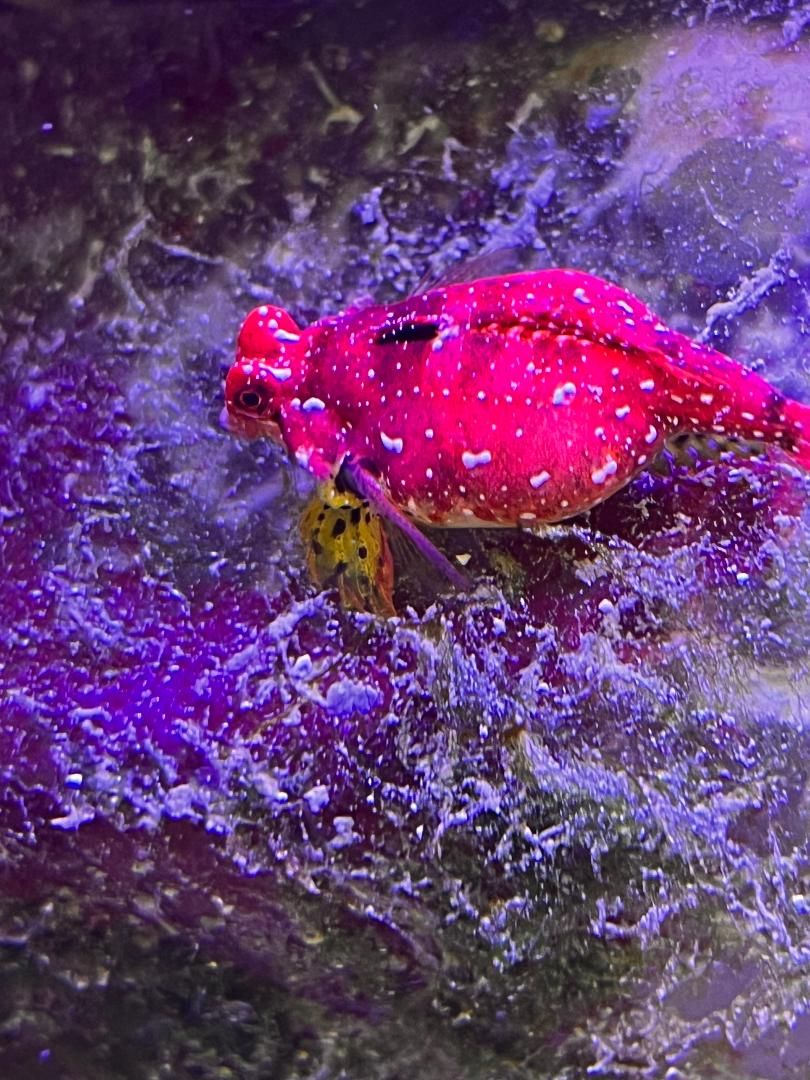
Quote:'
-" I'm not sure I've heard of any protocol that treats Ich in a day with copper and quinacrine."
:
No you didn't. Thats because I invented it in the early 70s. It's also in my book. I shouldn't have said "cured". I should have said "cleaned". You will not see spots in a day but I would keep the fish in there for maybe a week just to make sure. The quinicrine stays in the water and may tint the fish yellow for a couple of days. I think thats what they gave me in Viet Nam for Malaria. It was experimental.
I don't know if there is something in there that eats parasites. Maybe the sponge did but I eradicated that a while ago and I only had it for maybe 10 years while the tank is over 50.So - my guess is you have a ton of stuff in your tank that perhaps eats parasites, and your bioload is low.
I have about 45 or 50 fish in my 125 gallon tank. Most of them are small but the copperband, hippo tangs, Fireclowns, 3 filefish, Bangai Cardinals and Watchmans are not very small so I don't think my bio load is low.
None of the stores I frequent quarantine anything and remember I also take water from the sea along with seaweed, amphipods, worms, mud etc. Of course I don't quarantine that.
This is before I removed the sponge.
Last edited:
I also have my Log book from the early 70s and I have loads of fish I killed in there. No deaths or even infections in probably 40 years from any "communicable
disease. Of course some of my fish died from other things like Egg bound, which happens to dragonettes a lot and fish I stupidly added that I couldn't properly feed
Quote:'
-" I'm not sure I've heard of any protocol that treats Ich in a day with copper and quinacrine."
:
No you didn't. Thats because I invented it in the early 70s. It's also in my book. I shouldn't have said "cured". I should have said "cleaned". You will not see spots in a day but I would keep the fish in there for maybe a week just to make sure. The quinicrine stays in the water and may tint the fish yellow for a couple of days. I think thats what they gave me in Viet Nam for Malaria. It was experimental.
I don't know if there is something in there that eats parasites. Maybe the sponge did but I eradicated that a while ago and I only had it for maybe 10 years while the tank is over 50.
I have about 45 or 50 fish in my 125 gallon tank. Most of them are small but the copperband, hippo tangs, Fireclowns, 3 filefish, Bangai Cardinals and Watchmans are not very small so I don't think my bio load is low.
None of the stores I frequent quarantine anything and remember I also take water from the sea along with seaweed, amphipods, worms, mud etc. Of course I don't quarantine that.
This is before I removed the sponge.
Just for some background/context for Quinicrine/Atabrine - that is a very old school drug that never gained widespread use due to its toxicity and lack of efficacy. References for trying it date back to the early 1950's, it had been used as an anti-malarial in WWII. I don't know of anyone using it from the early 1970's going forward....
Jay
Similar threads
-
- AMS: Article
- Replies
- 2
- Views
- 812
- Replies
- 54
- Views
- 5,554
- Replies
- 204
- Views
- 13,408
- Replies
- 323
- Views
- 25,609
- Replies
- 218
- Views
- 12,389

















